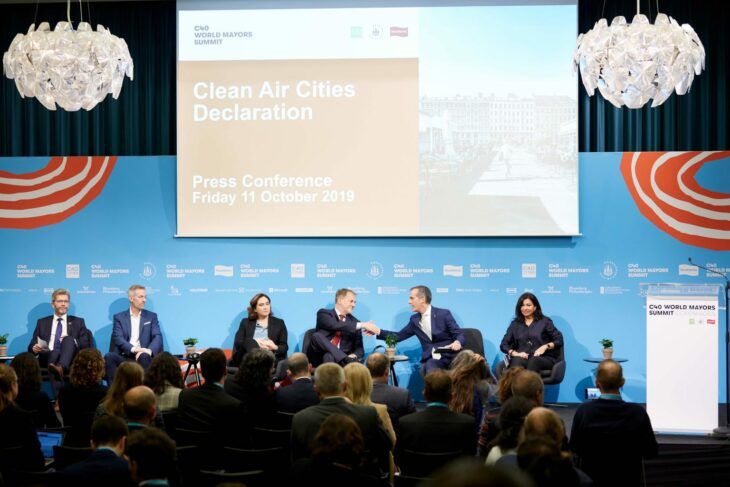The problem:
9 in 10 city dwellers breathe air that WHO guidelines say is dangerously polluted.
And in many cities air quality is getting worse. This is partly because authorities often lack understanding of the sources, scale and impact of pollution. This stops them designing effective policies and making a strong case for support by tracking and articulating the benefits to city residents.
Our residents deserve to know that future generations will inherit a liveable planet — and that our air, water, and natural resources will be protected and preserved. C40 Cities are leading the global work to reduce emissions with bold, concrete actions to ensure our children and grandchildren can breathe clean, healthy air.
Eric Garcetti – Mayor of Los Angeles and Chair of C40 Cities
The solution:
The C40 Cities Climate Leadership Group connects over 90 of the world’s greatest cities, representing one quarter of the global economy, to deliver urgent action against the climate crisis. Its Air Quality Programme works to raise mayors’ ambition and help them learn from each other, overcome gaps in data and evidence, and design and deliver solutions that clean the air that people breathe whilst also cutting greenhouse gas emissions.

The goals of the Air Quality Programme are built on the C40 Clean Air Cities Declaration, a pledge to:
- Set ambitious pollution reduction targets that meet or exceed national commitments within two years, putting them on a path towards meeting World Health Organization guidelines;
- Implement substantive clean air policies by 2025 that address the unique causes of pollution in their cities;
- Create a robust plan for air quality management and publicly report progress on achieving these goals.
The Impact:
So far, the declaration has been signed by 35 mayors across 6 continent – an unprecedented global coalition for clean air.
The Clean Air Fund supports a range of activities to help cities deliver on this commitment, from tailored support connecting cities facing similar challenges, to technical assistance that any city leader can use.
Ongoing projects and programmes we support include:
- The Air Quality Network – brings together cities and other partners to jointly identify and implement actions that reduce air pollutants and greenhouse gas emissions.A recent example is a collaboration between LA, Portland, Quito, Mexico City, London, and Delhi to develop rigorous assessments of the public health impacts of air pollution in their cities, to make the case for effective local policies.
- The Air Quality Technical Assistance programme provides direct support on solutions to air quality challenges like quantifying health benefits of local action, developing air quality monitoring strategies and deploying sensor networks.
- The AQ Integration in Climate Action Planning Project. A partnership between C40 and leading experts in air quality, health, and climate policy. The project develops state-of-the-art models and tools to quantify the public health benefits of city-scale climate policies, and create a framework for integrating air quality into climate action plans.
By supporting and highlighting the leadership of trailblazing mayors and demonstrating the measurable difference that air quality policies make to people’s lives, our goal is to inspire other towns and cities around the world to follow their lead in implementing transformational air quality and climate actions.